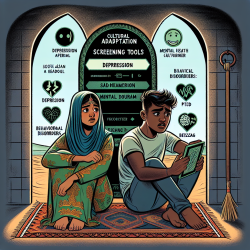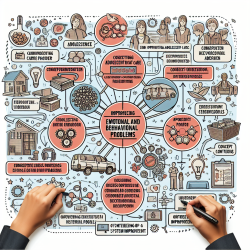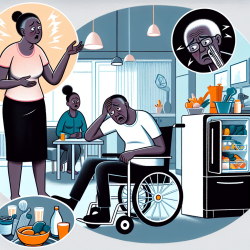Introduction
The mental health landscape in Nigeria, particularly among adolescents affected by conflict and other vulnerabilities, is a critical area that demands attention. The research article "Adapting culturally appropriate mental health screening tools for use among conflict-affected and other vulnerable adolescents in Nigeria" by Kaiser et al. (2019) provides insightful findings that can enhance practitioners' skills in this domain.
The Importance of Cultural Adaptation
One of the key takeaways from the research is the necessity of culturally adapting mental health screening tools. Simple translations are inadequate as they often lead to inaccurate conclusions. The study emphasizes the importance of ensuring semantic, content, technical, and criterion equivalence in screening tools to make them culturally relevant and effective.
Data-Driven Adaptation Process
The research employed a rigorous mixed-method approach to adapt the Depression Self Rating Scale, Child PTSD Symptom Scale, and Disruptive Behavior Disorders Rating Scale. This process involved expert translations, focus group discussions, and piloting with cognitive interviewing to achieve equivalence across languages and cultural contexts.
Challenges and Solutions
During the adaptation process, several challenges were encountered:
- Comprehensibility: Items were reframed as questions and specific time periods were added to improve understanding.
- Conceptual Difficulties: Some items were difficult for adolescents to grasp, such as "looking forward to the future." Efforts were made to find culturally specific terms to convey these concepts.
- Acceptability and Stigma: Certain items were potentially stigmatizing or unacceptable to discuss. Building rapport and encouraging open communication were essential strategies to overcome this.
Implications for Practitioners
Practitioners can leverage these findings to improve their screening processes by:
- Utilizing culturally adapted tools to ensure accurate detection of mental health issues.
- Engaging in further research to validate these tools across different languages and regions.
- Training community health workers to use these tools effectively, thereby enhancing community-based detection and referral efforts.
Conclusion
The study by Kaiser et al. underscores the importance of culturally adapting mental health screening tools to improve outcomes for vulnerable adolescents in Nigeria. By implementing these adapted tools, practitioners can play a pivotal role in addressing mental health needs and facilitating access to care.
To read the original research paper, please follow this link: Adapting culturally appropriate mental health screening tools for use among conflict-affected and other vulnerable adolescents in Nigeria.










